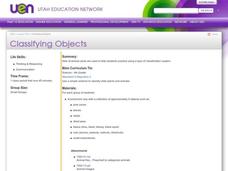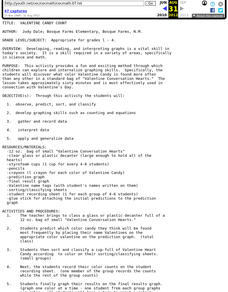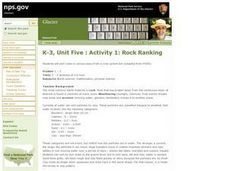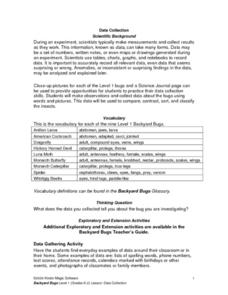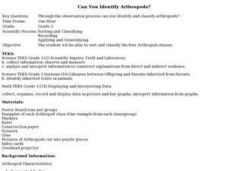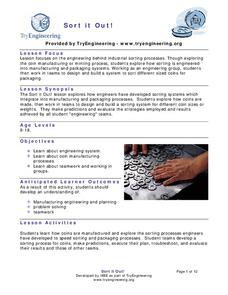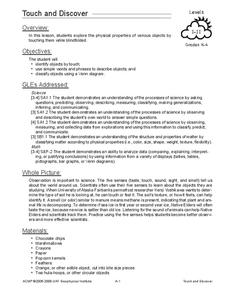Curated OER
Hardware Sort
Students work in groups to sort and classify a variety of hardware materials commonly found in the store. Students discuss attributes and explain their reasoning for different classifications.
Curated OER
Gummy Bear Sorting
Students demonstrate knowledge of sorting and classifying by color as they sort gummy bear candies.
Curated OER
Classifying Objects
Fourth graders work in small groups to sort and classify a variety of objects. They develop criteria for sorting and explain the characteristics they chose for classification. Groups record and share their classifications.
Curated OER
Valentine Candy Count
Here is an imaginative take on a classic lesson! Young scholars discover what color Valentine Candy is found more often than any other in a standard bag of Valentine Conversation Hearts. They observe, predict, sort, and classify the data...
Curated OER
Recycling Game ABC's and Sorting
Students participate in an ABC game based on recycling. In this recycling lesson, students sort objects into bins based on the first letter of each object. Students discuss the community and how to improve recycling.
Curated OER
Teaching with Collections
Students examine collections. In these real-world collections lessons, students examine and describe buttons and shells. Students will then sort, classify, and graph items according to various indicated descriptors.
Curated OER
Classification And Identification
Students explore diagrammatic and taxonomic keys and their application in the marine sciences. They sort and classify objects and organisms based on visual attributes.
Curated OER
Aim-- Use a Carroll Diagram to Sort Animals
For this science worksheet, learners cut out pictures of 12 animals and paste them into the correct space on the Carroll diagram. Students classify animals as living in water or land and with or without legs.
National Park Service
Rock Ranking
Junior geologists sort rocks and soil. They separate a sample of river gravel by size, shape, color, and other characteristics. To include Common Core standards, you could have little ones graph the number of particles in each sample.
Curated OER
Moth or Butterfly
Students categorize butterflies and moths by identifying the unique characteristics of the two different species. In this classifying lesson plan, students discuss their prior knowledge about these insects before...
Curated OER
Investigation: Reasoning and Proof
Students explore animal characteristics by creating illustrations. In this animal identification lesson, students read a list of animal descriptions which they draw using crayons or colored pencils. Students view their drawings and...
Curated OER
Big Bones, Little Bones
Learners investigate archeology. In this archeology instructional activity, students research the process of excavation. Learners participate in a mock-excavation and sort objects by physical properties.
Curated OER
Science NetLinks: It Counts
Students explore how numbers are assigned to objects, as well as think about more, less, or equal values. They describe, compare, and classify plants.
Curated OER
Science: Backyard Bugs Data Collection
Students practice data collection skills by observing common bugs found in their local environment. Once the data is collected they complete data sheets to compare, contrast, sort, and classify the insects. The lesson plan includes...
Curated OER
Can You Identify Arthropods?
Third graders sort and classify the four Arthropod classes. They are given puzzle pieces of one Arthropod example. Each group is to put their puzzle together, glue it on a piece of construction paper and label the ir puzzle.
Curated OER
Everybody Needs a Rock
Students, after making quantitative and qualitative observations of their rocks, construct a Venn diagram or dichotomous key to classify their rocks.
Curated OER
Sort It Out
Students study classification systems by sorting Legos and determining how the different pieces are classified. They list as many attributes as possible to use for sorting.
Curated OER
Bug Hunt
Students strengthen observational skills by searching for insects in their home and classroom. In this observation lesson plan, students use magnifying glasses to classify what kinds of bugs were found. Students then create a bar graph...
Alabama Learning Exchange
Yummy Apples!
Young learners listen to a read aloud of Gail Gibbons book, Apples and the story A Red House With No Windows and No Doors. They compare characteristics of a number of kinds of apples, graph them and create a apple print picture. Learners...
Curated OER
A World Of Matter
First graders complete a variety of experiments with solids, liquids and gases. They read books about matter, identify the characteristics of solids, liquids and gases and the sort and classify a variety of matter. Students make...
Curated OER
Backyard Bugs!
In this science and math worksheet, 2nd graders think of different ways they can sort bugs that are given to them in a bag. They complete a graph in which they sort the bugs with stripes, spots and solid colors.
Curated OER
Touch and Discover
Young scholars identify the physical properties of items using the sense of touch. In this touch and discover lesson, students describe items. Young scholars sort items using a Venn diagram.
Curated OER
Rocks
Students examine and classify various types of rocks. In this rock identification instructional activity, students complete a KWL chart about rocks and then read Let's Go Rock Collecting. Students go on a walk to collect...
Core Knowledge Foundation
Rocks & Minerals
Take young geologists on an exploration of the rock cycle with this six-lesson earth science unit on rocks and minerals. Through a series of discussions, demonstrations, and hands-on investigations your class will learn...


